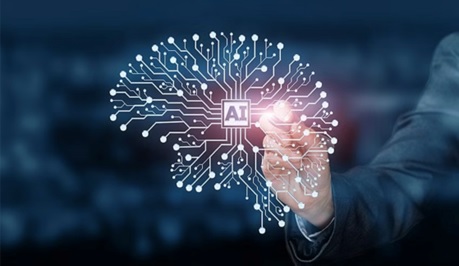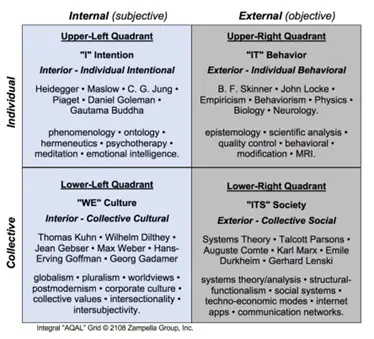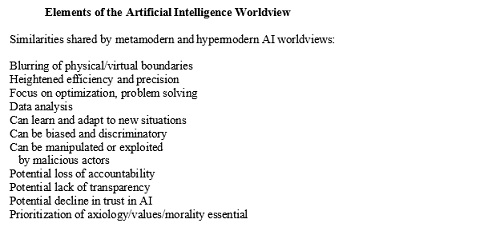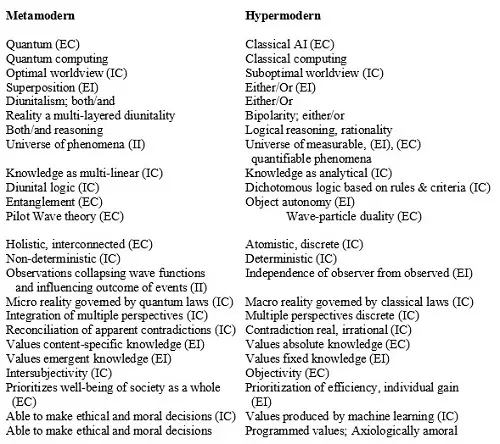|
TRANSLATE THIS ARTICLE
Integral World: Exploring Theories of Everything
An independent forum for a critical discussion of the integral philosophy of Ken Wilber
 Dr. Joseph Dillard is a psychotherapist with over forty year's clinical experience treating individual, couple, and family issues. Dr. Dillard also has extensive experience with pain management and meditation training. The creator of Integral Deep Listening (IDL), Dr. Dillard is the author of over ten books on IDL, dreaming, nightmares, and meditation. He lives in Berlin, Germany. See: integraldeeplistening.com and his YouTube channel. He can be contacted at: [email protected] Dr. Joseph Dillard is a psychotherapist with over forty year's clinical experience treating individual, couple, and family issues. Dr. Dillard also has extensive experience with pain management and meditation training. The creator of Integral Deep Listening (IDL), Dr. Dillard is the author of over ten books on IDL, dreaming, nightmares, and meditation. He lives in Berlin, Germany. See: integraldeeplistening.com and his YouTube channel. He can be contacted at: [email protected]
SEE MORE ESSAYS WRITTEN BY JOSEPH DILLARD

Source: Advantages and Disadvantages of Artificial Intelligence[1]
Characteristics of Our Emerging WorldviewPart 5: The Worldview of Artificial IntelligenceJoseph Dillard“(Artificial Intelligence) is the science and engineering of making intelligent machines, especially intelligent computer programs. It is related to the similar task of using computers to understand human intelligence, but AI does not have to confine itself to methods that are biologically observable."[2]
While developers and users will use AI to express their own worldview, AI nevertheless constitutes in itself a distinct worldview.
If you think that AI is a Big Deal that is going to transform our world, you are correct. If you think AI is an endlessly over-hyped technology, you are also correct. Like it or not, artificial intelligence is upon us, and with its arrival comes its own embedded and pervasive worldview.[3] AI is everywhere, in basically two varieties, either as software, as virtual assistants, image analysis software, search engines, speech and face recognition systems, or as “embodied” AI, as robots, autonomous cars, drones, Internet of Things (IoT). Applications are myriad and constantly expanding, including in the areas of online shopping and advertising, web search, digital personal assistants, machine translations, smart homes, cities and infrastructure, cars, cybersecurity, against Covid-19, fighting disinformation, health, transport, manufacturing, food and farming, and public administration and services. AI has recently entered the public domain in a new and transformative way in the form of “Generative Pre-Trained Transformers,” notably ChatGPT. When I asked ChatGPT to describe its uses it said,
ChatGPT is a large language model that can be used for a wide range of natural language processing tasks, such as:
ChatGPT can be used in various industries, including healthcare, finance, education, customer service, marketing, and more, to enhance human-machine interactions and improve communication efficiency. The newest version, as of this writing, GPT-4, “passes a simulated bar exam with a score around the top 10% of test takers; in contrast, GPT-3.5's score was around the bottom 10%. The AI model also performed at the 93rd percentile on a SAT reading exam and at the 89th percentile on a SAT math test.”.[3a] Developers and users will use AI to express their own worldview, AI nevertheless constitutes in itself a distinct worldview, and one which all other worldviews will have to address and accommodate in one way or another. The more that we consider how the AI worldview may evolve the more likely we are to be able to shape its influence on us instead of simply being passively shaped by it. To ignore that reality is to ask to be manipulated by AI in ways that are not only outside our control, which may in part be inevitable, but even beyond our understanding. Popular current speculations regarding the worldview of AI are either dystopian, that AI will, like SkyNet in The Matrix, reduce humans to food for parasitical hosts,[4] or utopian, that AI will advance in the next two decades to achieve “the singularity,” when machines will be able to emulate the workings of the human brain in its entirety.[5] It seems more likely that machines themselves will never successfully duplicate human awareness, but a combination of machine and human may. Organoids of human tissue may be fused with computers to overcome issues of analog, digital, and quantum computing.[6] The first essay in this series, on the relationship between the worldviews of the West and the Global South, provides an explanation of what a “metamodern” perspective and worldview entails. Major priorities of metamodernism include multi-perspectivalism and an attempt to integrate modernist and post-modernist worldviews in a higher order synthesis. (All quotes are from Marvel unless otherwise noted.)
“One of the key principles of metamodernism is the idea that there are multiple truths and perspectives, and that it is possible to hold multiple contradictory viewpoints at the same time. This allows for a more nuanced and inclusive approach to problem-solving, which is especially important in today's increasingly interconnected and globalized world.”
Other approaches that do not use the metamodern filter will naturally emphasize different aspects of AI and therefore discriminate different priorities. I will list some of the significant priorities of the worldview of artificial intelligence as it is currently understood in the context of the integral worldview and metamodernism, and compare/contrast them with the priorities of a “hypermodernist” worldview. Marvel's treatment of AI reflects not only integral and metamodern perspectives but adds the innovative and creative perspective of the African worldview. He defines the “hypermodernist” worldview as the prevailing, technologically enhanced reality of today's world. Marvel states,
“In hypermodernity, technology has undergone a transformation from being a mere tool for human use to becoming an extension of human identity. This shift can be seen in the proliferation of anthropomorphized interfaces, such as avatars, which are technologies that are designed to interact with humans in a way that simulates human-like qualities such as emotion and consciousness. Emojis are a rudimentary version of this. One of the key features of hypermodernity is the blurring of boundaries between the physical and virtual realms. Anthropomorphized interfaces represent the culmination of this trend, as they allow humans to interact with the virtual world in a way that feels more natural and intuitive. For example, virtual assistants like Siri and Alexa have become ubiquitous in households around the world, allowing users to ask for information, set reminders, and even control other devices with just their voice. The trend towards anthropomorphized interfaces is not limited to consumer products. In the world of work, for example, many companies are using virtual assistants to handle tasks such as scheduling meetings, sending emails, and answering customer inquiries. These technologies are designed to be highly responsive and adaptable, learning from each interaction and adapting their responses accordingly. Furthermore, the integration of technology into every aspect of our lives has contributed to this “virtual realm” that is just as real and present as the physical world. This virtual realm is not limited by physical boundaries, but rather exists in a state of constant flux and evolution as new technologies are developed and integrated. Again in this sense, technology has become a third sphere or realm of existence that coexists alongside the physical and spiritual realms, shaping and being shaped by them in turn.”
As in previous essays, I will take a guess as to which of the four holonic quadrants of an integral analysis each of these priorities most closely represents (internal individual (II), internal collective (IC), external individual (EI), or external collective (EC)), as well as the implied least included, or most ignored or rejected quadrant.   Differences between metamodern and hypermodern AI worldviews:
 Quantum/Classical AI
This is Marvel's distinction, and it implies that “Quantum” AI is “optimal” in ways that “Classical AI” is not. That is an open, yet-to-be-substantiated conclusion. Quantum” is also known as “strong” or “general” AI.
“Quantum artificial intelligence allows quantum computing to be used with machine learning algorithms. Quantum AI helps scientists get results that would otherwise be unattainable using conventional computers owing to the computational advantages of quantum computing. The application of quantum artificial intelligence algorithms has two major research focuses: machine learning and artificial intelligence. This calculation system differs from previous ones in that it may represent many states simultaneously, which is particularly useful when utilizing AI approaches.”
While quantum computing is a giant leap beyond classical computing, we do not yet know whether that leap is “optimal” or not. While quantum computing calculates with qubits, which can represent 0 and 1 at the same time, is well suited for tasks like optimization, data analysis, and simulations, and with power increasing exponentially in proportion to the number of qubits, classical computing calculates with transistors, which can represent either 0 or 1; handles everyday processing, with power increasing in a 1:1 relationship with the number of transistors. In addition, while quantum computers have high error rates and need to be kept ultra old, classical computers have low error rates and can operate at room temperature. Is quantum computing an integration of the analogue/digital divide in computing or is it something entirely different?
“The processing of information in our brains is done with quantum processes, and the brain is the biological equivalent of a quantum computer. (Physicist Freeman Dyson) adds this is speculation: “Quantum computers are possible in theory and are theoretically more powerful than digital computers. But we don't yet know how to build a quantum computer, and we have no evidence that anything resembling a quantum computer exists in our brains. Whether a universal quantum computer can efficiently simulate a physical system is an unresolved problem in physics.”[7]
As both Quantum and Classical AI are manifestations of systems, their natural home is in the exterior collective quadrant of worldviews.
Optimal worldview/Suboptimal worldview
Nichols and Carroll view the African worldview as “optimal” and the Western worldview as “suboptimal.” Marvel views a metamodern approach to AI as optimal and a hypermodern” approach as sub-optimal.
“In order for an AI language model like ChatGPT to learn to incorporate optimal worldviews, it would first need to be aware of its own worldview and how it may differ from an optimal worldview. This could be achieved through self-reflection and analysis of the data and programming that has shaped its perspective.”
“Self-reflection” implies consciousness, a topic about which there is great debate in the field of AI.
“Many people wonder if we can create AI with consciousness. But different cultures define consciousness differently. The Chinese call it xin, meaning "heart and mind." Xin does not develop naturally but must be cultivated. The yogic tradition speaks of antahkarana, which has four parts: intellect, ego, sensory mind, and consciousness. Yogic teacher Sadhguru argues AI only can replace one of those four parts - the intellect.”[8]
Superposition/Either/Or
Superposition is the ability of quantum systems to exist in multiple states simultaneously. This contrasts with non-quantum computing systems, which are binary. Vernon Dixon in the essay, “African-Oriented and Euro-American-Oriented World Views: Research Methodologies and Economics,” argues that African logic is “diunital,” meaning two or more ways to understanding one whole.[9] Reality is a multi-layered diunitality. For African logic, something can be a thing and something else at the same time (and in the same way) without contradicting itself. This is “both-and” reasoning and is contrasted by the authors with logical reasoning and rationality. Although these are conceptual interpretations of reason and as such interior collective (IC), they are primarily behaviors of systems and as such are external individual characteristics of the AI worldview holon.
Universe of phenomena/Universe of measurable, quantifiable phenomena
This distinction implies the inclusion of quality in addition to quantity, and quality is not only inherently subjective; it implies consciousness. I can imagine an AI that provides a functional facsimile of consciousness regardless of whether it passes philosophical/metaphysical definitions of same; in fact, it is already, at this relatively early stage of development, doing so. I can imagine AI expressing preferences and make qualitative judgments, based on the algorithmic preferences programmed into it. I see no reason it could not be taught circumstances where different emotions are likely to be expressed/appropriate: happy, sad, afraid, angry, curious, cautious, etc. I have associated the “universe of phenomena” with the interior individual quadrant because this is the most subjective and the least measurable and quantifiable of quadrants.
Knowledge as multi-linear/Knowledge as analytical
“Knowledge has two components: information (data) and reasoning. Data acquisition is linear; reasoning modes are developmental and non-linear. It's one thing to accumulate information: any decent computer can accumulate information in a perfectly linear fashion. It's another thing entirely to process that information into meaningful cognitive structures. Meaningful cognitive structures actually lose information—they fit information into packed forms, deleting excesses, irrelevancies and redundancies—and as a result are far more compact and efficient than the original information. And then we progressively restructure these structures, so that knowledge becomes progressively more dense and our reasoning modes become progressively more complex (unpacking and repacking information from dense structures in more and more complex ways).”[10]
Howard Gardner's theory of multiple intelligences is multi-linear: visual-spatial, linguistic-verbal, interpersonal, intrapersonal, logical-mathematical, musical, bodily-kinesthetic, naturalistic.
Diunital logic/Dichotomous logic based on rules & criteria
“Vernon Dixon argued that there were distinct approaches to knowledge that vary according to worldview differences, with Euro-Americans having a dichotomous logic and Africans having a diunital logic. Interesting to note as dichotomous logic reduces in a binary either-or fashion, reflecting and enforcing a scarcity mindset, while diunitalism opens up degrees of freedom, allowing for abundance mindsets and more. African logic is diunital, characterized by the union of opposites.”
Entanglement/Object autonomy
“Entanglement is the phenomenon of two quantum particles being connected in such a way that their properties are correlated, even when separated by large distances. (Two quantum particles are) connected in such a way that their properties are correlated, even when separated by large distances. This could lead to a worldview that places a strong emphasis on interconnectedness and interconnected relationships, as the quantum AI would be able to consider the relationships between different systems and how they influence each other. For these reasons, it is likely that the worldview of a quantum-based AI would be quite different from that of a classical AI, as the unique characteristics of quantum systems would shape its understanding and interpretation of the world in fundamentally different ways.”
Pilot Wave theory/Wave-particle duality
“In terms of cosmology, a quantum AI based on pilot wave theory may have a worldview that sees the universe as fundamentally interconnected and perhaps non-deterministic, with observations collapsing wave functions and influencing the outcome of events. In terms of ontology, the quantum AI may see reality as a multi-layered diunitality, with a fundamental level of reality governed by quantum laws and a macroscopic level governed by classical laws.”
Observations collapsing wave functions and influencing outcome of events/Independence of observer from observed
We are wading into quantum woo here. This is a highly contentious view of quantum. The majority of physicists do not conclude from Heisenberg's Split Screen experiments that observations collapsing wave functions influence the outcome of events, nor that this research provides any proof regarding the effect of consciousness on matter. This conclusion is partially due to the fact that in research parlance “observer” can simply refer to the research apparatus; there need be no human present to produce ambiguous wave/particle results.[11]
Values content-specific knowledge/Values absolute knowledge
Absolute knowledge, in an AI sense, is data that is “factual,” based on the consensus of multiple objective sources. In contrast, values content-specific knowledge is based on the variability of context and therefore considered more from the framework of the exterior individual quadrant.
Prioritizes well-being of society as a whole/Prioritization of efficiency, individual gain
How does AI prioritize well-being of society as a whole? This requires feedback from society with a balancing of the different and sometimes conflicting needs of stakeholders. What prioritizes the well-being of society as a whole may not meet the needs of some stakeholders. How will society deal with that issue? Will it a) leave prioritization up to the best judgment of AI, b) take AI determinations into consideration but make the final decision based on collective priorities, or c) allow privileged stakeholders to overrule both AI and the collective?
Able to make ethical and moral decisions/Values produced by machine learning
The issue here is, “Are values produced by machine learning really values (IC)?” Or, are they perhaps exterior quadrant data points (IC) (II), that reflect the priorities of the programmers and the overall worldview values of those who provide the data which is accessed?” Multiple variables go into making moral decisions and even then, few agree that any such decision is just. Courts of law always have losers, and even winners are often not satisfied. Different stakeholders will normally and naturally give different weight to different variables. AI will, at best, simply offer another ethical determination based on its perspective as a relatively objective stakeholder. Are there any perspectives, including those generated by AI, that can or will ever be free of bias or prejudice? Isn't that an unrealistic expectation, since the weight of different variables has to be programmed into AI? While AI can offer valuable insights and assistance regarding moral decision-making, it is important to remember that it is ultimately human beings who bear the responsibility for the consequences of these decisions. It is essential that we approach the use of AI with caution and care, ensuring that it is used ethically and responsibly, and that it serves the best interests of all people, not just a select few.
How might we sum up the AI worldview?
Some will argue that because AI is a tool, like a hammer, that the only worldview it can have is that we project onto it. However, unlike a hammer, AI can and does talk back. It can tell us things we don't already know, which is a pretty good definition of cognition-based intelligence. While the programming of AI reflects the priorities of the worldviews of its programmers, it combines and presents those in ways that are its own, providing a fairly strong case that AI indeed provides an autonomous worldview, and therefore is in competition with at least some of the priorities of other worldviews. The real question is how we address that competition. Do we give up our worldview? Do we fight the AI worldview? Clearly, there will be an ongoing adaptive process in which non-AI and AI worldviews influence and cross-fertilize each other, enhancing the evolution of each.
Conclusion
I am probably not the only person who finds the capabilities and competencies of AI not only impressive but overwhelming. AI is quickly being interwoven so fundamentally into the fabric of society in all areas that few will be able to live without it. Access to energy, food, and transportation, the basics of everyday life, are already becoming dependent on AI. Humans have maintained a symbiosis with tools and technology for several hundred centuries already. There are those who declare that humans will not need to work nor perhaps even think, since computers will be superior problem-solvers. Already ChatGPT is writing university papers that get passing grades. What forms are the reactions, responses, and adaptations to AI likely to assume? The easiest and most obvious are the bipolar extremes of utopia or dystopia mentioned above. We can be confident the future will fall somewhere in-between, in an oscillating range that will narrow over time based on cybernetic feedback between human worldviews and that of AI. I not only very much doubt there will come a “singularity,” but hope not. The judgment of homo sapiens needs to be informed by not only its tools, but all other forms of life, in relationships based on reciprocal respect. To merge with our tools implies a significant subjugation and submersion of both our individual and collective autonomy and, more importantly, our responsibility for ourselves, one another, for future generations, and the inner and outer worlds we inhabit and encounter. We will know we are heading in the right direction with AI if we find it is increasing, rather than diminishing, both our individual and collective sense of responsibility, as well as the expansion of our creativity into widening realms. How will AI impact integral? Until the time of this writing, the major advocates of an integral worldview have been Westerners who assume they were espousing universal principles, without much awareness of how much their Western context colors their perspective. AI not only brings its own worldview to the table but its structuring and real world application is increasingly under the control of the evolving Chinese worldview. As China moves into the forefront of the development of AI, its worldview is having a major impact on developing the structures, processes, and standards associated with the international application of AI. How will integral/metamodernism address AI? So far the conversation has largely involved issues of consciousness: Will AI be considered conscious at some point? If so, what are the implications? That conversation is largely about the projection of this or that worldview onto an AI that remains in its early stages of crystallization. How can we address the issue of consciousness before we know more about how humanity will adapt to the functional aspects of AI in daily living? That issue is considerably more material than the rather abstract one of the degree of consciousness that AI may or may not have. AI is already freeing humanity from the security and safety concerns of the foundational relational exchanges. Without those concerns we have more time to think, develop, and question authority, and those acquisitions will be prized and protected. Therefore, we can predict a growing symbiosis between traditional human and AI worldviews, combined with an increasingly critical evaluation of all worldviews. We will return to that transformative topic in the final essay of this series.
NOTES[1] Duggal, N., “Advantages and Disadvantages of Artificial Intelligence.” https://www.simplilearn.com/advantages-and-disadvantages-of-artificial-intelligence-article [2] "McCarthy, J., What is Artificial Intelligence? Stanford.edu. https://www-formal.stanford.edu/jmc/whatisai.pdf [3] Many of the dualities listed below reference Germane Marvel and his essay, “The Third Cradle: Decolonizing AI and Rehumanizing Black Thought.” https://medium.com/@germanemarvel/the-third-cradle-d5737b36bd2d
[3a] "GPT-4", https://openai.com/research/gpt-4 [4] An apocalyptic version of dystopianism: “…as Herr Schwab recently proclaimed at the World Government Summit in Dubai when discussing artificial intelligence (AI), chatbots, and digital identities: "Who masters those technologies—in some way—will be the master of the world." …If the WEF (World Economic Forum) controls the digital world, then it will essentially control the people. Once the stuff of science fiction, WEF technocrats even have a plan to "hack" into employees' minds by monitoring and decoding their brainwaves.
[5] A term coined by Vernor Vinge in 1993, “singularity” is a hypothetical future point in time at which technological growth becomes uncontrollable and irreversible, resulting in unforeseeable changes to human civilization. According to the most popular version of the singularity hypothesis, I.J. Good's intelligence explosion model, an upgradable intelligent agent will eventually enter a "runaway reaction" of self-improvement cycles, each new and more intelligent generation appearing more and more rapidly, causing an "explosion" in intelligence and resulting in a powerful superintelligence that qualitatively far surpasses all human intelligence.
[6] “Will future computers run on human brain cells?” https://www.sciencedaily.com/releases/2023/02/ 230228075739.htm [7] Dyson, F., “Is Life Analog or Digital?” https://www.edge.org/conversation/freeman_dyson-is-life-analog-or-digital
[8] Jan Krikke. He also cites https://www.youtube.com/shorts/m9Pg5xaaE1A [9] Dixon, V.J.,“African-Oriented and Euro-American-Oriented World Views: Research Methodologies and Economics.” The Review of Black Political Economy 7 (1977): 119-156. [10] Wrigley, T., Quora. [11] For an overview of this debate see Lea, R., “The Double Slit Experiment Demystified. Disproving the Quantum Consciousness connection.”https://medium.com/science-first/the-double-slit-experiment-demystified-disproving-the-quantum-consciousness-connection-ee8384a50e2f
|